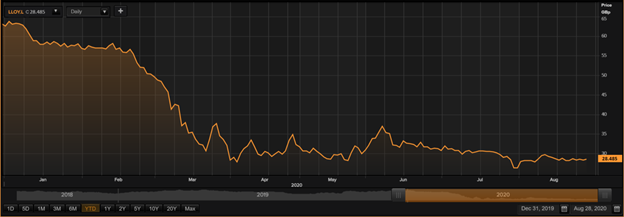Summary
- A recent ruling by a court in the UK over the PPI scandal has opened the way for fresh claims to be brought against most banks in the country which has already bled billions in compensation claims over the past ten years.
- The new ruling could mean Lloyds bank will have to significantly increase its provisioning this year which will reflect on its bottom lines.
- The government has asked all banks in the country to provide mortgage support to their clients after the coronavirus payment holiday period ends. This will put an extra burden on the banks for the second half of the year
The Ghost of the Payment Protection Insurance (PPI) scandal is back to haunt the banking industry. A new ruling by a court in the country has paved the way for aggrieved customers to file fresh claims after the earlier deadline had passed in August 2019, where the banks had already paid for compensation claims amounting to £38 billion. The new ruling, which is on account of massive commission fees paid to the banks by insurers, which was never disclosed to customers, has now been termed by the courts as unfair. This means that banks now face claims not only from people who aggrieved but also from people who are satisfied with their policies. During the period of 1990 and 2010 when the scandal took place, nearly 64 million PPI policies were sold out of which only about 23.4 million claims were made till the August 2019 deadline. This means that the scope for new compensation claims could be as large as the previous one. The operations of Lloyds Banking Group Plc (LON: LLOY) like all other banks have been badly hit by the coronavirus pandemic, with the additional challenge of a no-Brexit deal looming large at the end of this year, which could see its financial situation sink deep during the next one year at least.
What are PPI claims and how they have impacted Lloyds bank?
PPI schemes were designed to provide protection for loan repayments and credit cards if a borrower during the tenure of the loan lost his job or becomes unable to work. While it may seem a just feature in a loan, but when they were sold to customers, they were not informed about it, which resulted in them paying for something they did not know they were buying. These policies: for which insurance companies paid commission to banks were found to be unfair by courts, which led to the present order of compensation to the customers.
Till now Lloyds bank has paid compensations of £20 billion for customers claims till the deadline last year and had created a further provision of £550 million. This sum was the highest claim amount paid by any bank in the United Kingdom because of the scandal. The new ruling could require the bank to make a provision of at least as much as they had paid last year, which given the present state of the economy has every possibility of taking the bank into the red.
How could the recent judgement affect the bank's financial situation?
In the half-yearly report of the company for the period ending 30 June 2020 the company has made an underlying loss of £281 million but has made a Statutory profit after tax of £19 million on account of the tax credits, it has received. In view of the present claims, the company would have to make large provisions which could keep it in the red for quite some time.
What impact the government’s dictate of mortgage support would have on the bank?
In the month of March, when the coronavirus related stimulus packages were announced the government had asked the banks to extend a three month payment holiday for all who required help during the pandemic. In the month of May, this scheme as again extended for repayment breaks from June onwards. Till date, nearly 1.9 million customers in the country have availed of this scheme which is nearly a sixth of all mortgage customers in the country. Thus a significant amount of cash flow into the coffers of the banks is currently constricted, leave alone the interest income that has already been lost on them.
The governments directive to rework the repayment plans with its current mortgage lenders will shrink the banks’ ability to lend and thus impact its bottom-line.
What has been the performance of the company on LSE during the year

(Source – Thomson Reuters)
The shares of Lloyds Banking Group Plc fell sharply in the first half of the year to reach a low in the month of March when the lockdown was imposed, however, since then they have been trading steadily. On 2 January 2020, the shares of the company were trading at GBX 63.71 per share, from where they fell by 52.00 per cent to reach a low of GBX 30.57 per share on 23 March 2020. Since then they have been trading in a marginally downward trend, maintaining almost the same level and on 28 August 2020 at 11.40 am they are trading at GBX 28.485 per share.
The shares of the company are identified and trade on the London Stock Exchange under the ticker name LLOY on the premium main market segment. The shares of the company are also form the part of the FTSE 100 index.
Summary
To sum up, it can be said that the PPI scandal will continue to haunt the British banking industry for some more time now. But Lloyds bank will be able to expand its operations once the pandemic situation improves. The bank has also participated in the BoE guaranteed Coronavirus Business Interruption loan scheme (CBILS) ensuring that a significant amount of its loan assets acquired this year are of higher quality and will provide strength to its balance sheet.



